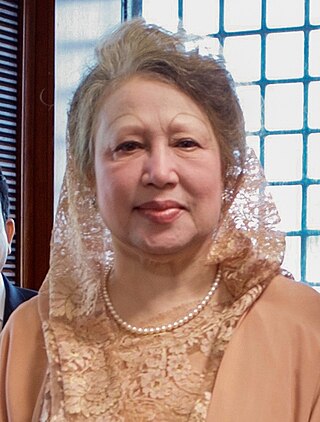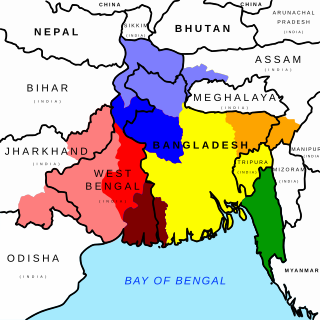
Sheikh Mujibur Rahman, popularly known by the honorific prefix Bangabandhu, was a Bangladeshi politician, revolutionary, statesman, activist and diarist. As a politician, Mujib had held continuous positions either as Bangladesh's president or as its prime minister from April 1971 until his assassination in August 1975. Mujib successfully led the Bangladeshi independence movement and restored the Bengali sovereignty after over two centuries following the Battle of Plassey in 1757, for which he is honoured as the 'Father of the Nation' in Bangladesh. In 2011, the fifteenth constitutional amendment in Bangladesh referred to Sheikh Mujib as the Father of the Nation who declared independence; these references were enshrined in the fifth, sixth, and seventh schedules of the constitution. His Bengali nationalist ideology, socio-political theories, and political doctrines are sometimes called Mujibism.

Begum Khaleda Zia is a Bangladeshi politician who served as the prime minister of Bangladesh from March 1991 to March 1996, and again from June 2001 to October 2006. She was the first female prime minister of Bangladesh and second female prime minister in the Muslim world, after Benazir Bhutto. She is the widow of former president of Bangladesh Ziaur Rahman. She is the chairperson and leader of the Bangladesh Nationalist Party (BNP) since 1984, which was founded by her late husband in 1978.

Elopement is a marriage which is conducted in a sudden and secretive fashion, sometimes involving a hurried flight away from one's place of residence together with one's beloved with the intention of getting married without parental approval. An elopement is contrasted with an abduction, in which either the bride or groom has not consented, or a shotgun wedding in which the parents of one coerce both into marriage.
Pakistan has five major ethno-regional communities in Pakistan: Baloch, Muhajir, Punjabis, Pushtuns and Sindhis, as well as several smaller groups. There are also religious and sectarian groups such as Ahmadis, Christians, Hindus, Kalasha, Parsis and Sikhs, and Shia Muslim sects including Ismailis and Bohras.

Zainul Abedin, also known as Shilpacharya was a Bangladeshi painter. He became well known in 1944 through his series of paintings depicting some of the great famines in Bengal during its British colonial period. After the Partition of Indian subcontinent he moved to East Pakistan. In 1948, he helped to establish the Institute of Arts and Crafts at the University of Dhaka. The Indian Express has described him as a legendary Bangladeshi painter and activist. Like many of his contemporaries, his paintings on the Bengal famine of 1943 are viewed as his most characteristic works. His homeland honored him with the title "Shilpacharya" "Great teacher of the arts" for his artistic and visionary attributes. He was the pioneer of the modern art movement that took place in Bangladesh and was rightly considered by Syed Manzoorul Islam as the founding father of Bangladeshi modern arts, soon after Bangladesh earned the status of an independent republic.

Bangabandhu National Stadium, formerly known as the Dhaka Stadium, is a multipurpose sports arena and the national stadium of Bangladesh. Located in the Motijheel area of Dhaka, it is predominantly used for football matches and serves as the home venue for the Bangladesh national football team. The stadium is well known for hosting a high-profile international friendly between Argentina and Nigeria in 2011.
Arranged marriage is a tradition in the societies of the Indian subcontinent, and continues to account for an overwhelming majority of marriages in the Indian subcontinent. Despite the fact that romantic love is "wholly celebrated" in both Indian mass media and folklore, and the arranged marriage tradition lacks any official legal recognition or support, the institution has proved to be "surprisingly robust" in adapting to changed social circumstances and has defied predictions of decline as India modernized.

Dhaka Cantonment is a Cantonment located in the northern part of Dhaka, Bangladesh. The headquarters of the Bangladesh Army and Air Force are situated within the cantonment which combined form the Armed Forces of Bangladesh. The Cantonment is located on the north-east end of Dhaka.

Stranded Pakistanis in Bangladesh are Muslim migrants with homelands in present-day India who settled in East Pakistan following the partition of India in 1947.

A Bengali Muslim wedding is a Bengali wedding in accordance to Muslim faith. It includes rituals and ceremonies that may span up to three days maximum. In most cases, it starts with the Dekha Dekhi. Then, nikah which is done by a Qazi with a fixed denmohor and it ends with the Bou Bhat ceremony that is popular as the wedding reception arranged by the groom's family. It's the dominant tradition of wedding seen in Bangladesh.

Peace TV is a non-profit Emirati satellite television network that broadcasts free-to-air programming. It is one of the world's largest religious satellite television networks. On 21 January 2006, Zakir Naik created the network, which is based in Dubai.

Lesbian, gay, bisexual, and transgender (LGBT) people in Bangladesh face widespread social and legal challenges not experienced by non-LGBT people.
The origins of the Baháʼí Faith in Bangladesh begin previous to its independence, when it was part of British Raj. The roots of the Baháʼí Faith in the region go back to the first days of the Bábí religion in 1844. During Baháʼu'lláh's lifetime, as founder of the religion, he encouraged some of his followers to move to India. It may have been Jamál Effendi who was first sent and stopped in Dhaka more than once. The first Baháʼís in the area that would later become Bangladesh was when a Bengali group from Chittagong accepted the religion while in Burma. By 1950 there were enough members of the religion to elect Local Spiritual Assemblies in Chittagong and Dacca. The total number of Baháʼís in Bangladesh is too small to have any major direct impact on society at large. However, the World Christian Encyclopedia estimated the Baháʼí population of Bangladesh about 9,603 in 2010. Baháʼís are widely persecuted in Bangladesh. According to The Business Standard the population is about 300,000.
Honour killings in Pakistan are known locally as karo-kari. According to the Human Rights Commission of Pakistan, over 470 cases of honour killings were reported in Pakistan in 2021. But human rights defenders estimate that around 1,000 women are murdered in the name of honour every year. An honour killing is the murder of a member of a family or social group by other members, due to the belief the victim has brought dishonour upon the family or community. The death of the victim is viewed as a way to restore the reputation and honour of the family.
Love jihad is an Islamophobic conspiracy theory promoted by right-wing Hindutva activists. The conspiracy theory purports that Muslim men target Hindu women for conversion to Islam by means such as seduction, feigning love, deception, kidnapping, and marriage, as part of a broader demographic "war" by Muslims against India, and an organised international conspiracy, for domination through demographic growth and replacement.
Arranged marriage is a type of marital union where the bride and groom are primarily selected by individuals other than the couple themselves, particularly by family members such as the parents. In some cultures, a professional matchmaker may be used to find a spouse for a young person.

Love Commandos is a voluntary non-profit organization in India which helps and protects couples in love from harassment and honor killing. They provide housing, legal aid, and protection to couples seeking their aid who are being persecuted by family and society for wanting to marry based solely on mutual attraction and love.
There is little pre-colonial texts that have survived in Bangladesh noting on homosexuality, and also in overall, homosexuality in the country has a very short written history but concepts of the third gender has always been part of the culture.

Mustafizur Rahman is a Bangladeshi international cricketer. A left-arm medium fast bowler, he is recognized for his most prolific 'slower cutters' all over the world. Born on 6 September 1995, in Satkhira, Bangladesh, Mustafizur Rahman's career took off during the 2015 Bangladesh Premier League when he caught the attention of cricket pundits with his ability to bowl accurate cutters and slower deliveries, earning him the nickname "The Fizz." This talent quickly propelled him to international prominence. He plays for Chennai Super Kings in IPL and is a left-arm fast-medium bowler.
Sexuality in Bangladesh is primarily influenced by religion and culture. The culture in Bangladesh is predominantly conservative and patriarchal. Several topics, including sex education, romantic relationship, and sexual behavior are considered taboo. Over the years, the perception towards a very few taboos have changed, such as sex education is now somewhat taught in high schools though in a conservative way.












